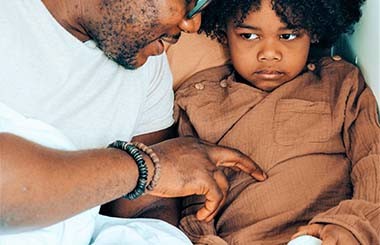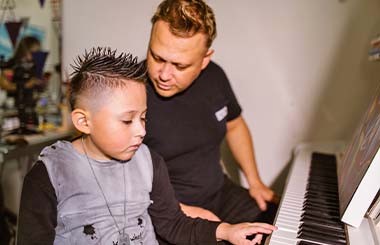On this page…
Resources you can access if a child or young person is experiencing difficulties / unhelpful emotions. Also 'Additional Services' for more direct support.
Resources you can access if a child or young person is experiencing difficulties / unhelpful emotions. Also 'Additional Services' for more direct support.

As a parent / carer it’s natural for us to want to rescue our children from these feelings by removing them from situations that might cause them worry. However, a more helpful approach is to empower the child and promote their confidence in their ability to cope with any situation they find themselves in. When your child is showing signs of being anxious, you might want to try breathing slowly with them, counting to five as you breathe in, and then counting to five again as you breathe out. It can also be helpful to reassure your child that the anxiety they are feeling will pass and that they will feel okay again. You could describe it like a wave that they can ride or surf until it peaks, breaks and gets smaller.
If you want to learn more about how to support your child when they are feeling worried, here are some websites and downloads that you might find helpful.

You might find your child is unsure as to what’s causing their low mood, in these cases we recommend avoiding asking too many questions or offering multiple solutions. Instead they may value you simply being there for them, either to listen to what’s on their mind or to distract them by watching a film, going for a walk or making dinner together. It can also be helpful to set small tasks and goals with your child to encourage them to slowly work towards feeling more positive and more accomplished. For example, you could write together a list of small tasks like taking a shower, drinking water, making their bed, getting dressed and eating some food.
If you feel that your child is really struggling with feeling sad and you’re worried that it might be having a significant impact on their mental health, we recommend you speak to a professional such as your local GP or School Nurse. If you want to learn more about how to support your child when they are feeling sad, here are some websites that you might find helpful.

If you are worried that your child’s self-esteem is having a significantly negative impact on their day-to-day life, we would recommend you reach out to a professional (Teacher, GP, School Nurse, Youth Worker, Social Worker) for further advice and help.
If you’d like to find out more ways to help improve your child’s self-esteem you can find some helpful websites below.

It can be hard to always understand why your child might be struggling at home. It’s important to consider factors both in and out of the house that could be affecting them such as school, friendships, extra curriculum activities, relationships with other family members and their thoughts, feelings about themselves (see struggling with self-esteem section for more information). As their parent or carer, you might find it helpful to reflect on these factors and question as to what you can do to help your child. This might involve speaking your child directly and making plans with them to try and improve their situation. You could also speak to their teachers or other professionals such as Family Support Workers, Youth Workers or Social Workers for further advice and help.
If you’d like to find out more ways to support your child at home here are some websites that you might find helpful.

If your child is feeling bullied there are a number of things you can do to support them. It is helpful to start by having a conversation and encouraging your child to open up about their experience. Your key role in supporting them can be listening, calming and reassuring. It is hard, but helpful, to not retaliate. You can reassure them that the bullying is not their fault and talk about who is around to support them, such as yourself as a parent/carer, School or friends.
If you want to learn more about how to support your child when they are feeling bullied, here are some websites that you might find helpful. Whilst these resources are useful, we know that the best way to beat bullying is to speak with your support system.

Fortunately, there are a lot of things you can do to support your child with sleep. A consistent relaxing bedtime routine is a great place to start and ensuring that they have “down time” before bed. That might look like reading books, having a bath, drawing some pictures or spending some quiet time with the family to talk about the events from the day. You might also find it helpful to talk through with you child about any worries they might have a few hours before bedtime. This gives them space to think constructively with you about their problems, consider possible solutions and then have time to relax before bed.
If you want to learn more about your child’s bedtime routine and what might help them sleep, here are some websites that you might find helpful.

Your child may struggle with food in other ways such as struggling with the taste or texture of certain foods. This can make it difficult to get the nutrition that is needed and can cause social difficulties such as eating out with family/friends. Other difficulties such as anxiety and low mood can impact on our appetite making us feel not hungry or that we don’t want to, or can’t, eat. If you feel that your child may be experiencing anxiety or low mood that is impacting on their eating then you might find our other sections My child is feeling worried or My child is feeling sad helpful, as when we focus on getting help for these difficulties you may find that their appetite will come back!
If you are concerned about your child’s eating, you may want to start by having a conversation with them about any other difficulties that could impact on their appetite. Trying to have food “little and often” can also be helpful and feel less overwhelming for them if they are struggling. Consider high energy foods and slow-release carbohydrates to ensure that they have the energy they need throughout the day. We would also suggest seeking support from your GP for a check-up if you are concerned about your child’s health or their weight, as well as checking out some of the resources below for more information.

Hearing voices, or “auditory hallucinations”, can be a part of a mental health problem, such as Psychosis, which requires a careful assessment by a mental health professional. However, Psychosis is not common in young people and the “voices” are more often related to anxiety, difficult situations, substance misuse or a traumatic event such as a bereavement, family breakdown or experiencing abuse. It can be helpful to talk with your child to begin to understand their experience of this and to consider if there are other difficulties such as those listed above.
It is very important to understand that not everyone hearing voices needs support or help with their mental health and wellbeing; however it is important to seek help if the voices become hostile, intimidating, giving instructions or start to have a negative impact on your child’s day to day living. Below are some helpful resources. If you are concerned about substance misuse for your child then please see our section Struggling with Substance Misuse for further advice.


If you feel that they are at risk of harm from someone else you can discuss your concerns with First Response on 0800 131 3126 and they will be able to help and give advice on how to further safeguard your child.
If your child is having unwanted thoughts about harming other people, these can often be very distressing and create anxiety for your child as they may begin to worry that they might do this. It can be helpful to assure them that these are “thoughts, not facts”. Intrusive and unwanted thoughts can be upsetting but with time and distraction they can pass. It may be helpful to look at our sections on Feeling Worried, as they may be linked to anxiety.
Hearing that your child is experiencing suicidal thoughts can be incredibly distressing for a parent or carer. Your child may express thoughts around harming themselves or not wanting to be alive anymore. The thoughts can range from thinking about ending their life, or feeling that people would be better off without them, to thinking about methods of suicide, or making clear plans to end their life. It is important to try to calmly talk to your child about these thoughts. You may be worried that asking questions about this will make the thoughts worse or make them more likely to act on them, but it won’t. It’s more likely that talking and listening to your child will be helpful as it allows them space to talk through their thoughts (if they feel able to) and know that you are simply there for them. It can also be helpful to “keep busy” and distract them away from these thoughts, this might be by doing a family activity, watching a film or spending time together. Some young people find using a “traffic light” system of communication helpful to let you know how they are feeling, Green would be feeling okay, Yellow may be feeling wobbly and Red would show they are really struggling and feeling unsafe.
If you are concerned that your child is feeling suicidal you can speak to School or you GP who will be able to guide you to access further support. You can also seek urgent help for your child via our urgent help section for telephone support and advice, or if you feel they are at immediate risk and you cannot keep them safe then call 999.

Below we have some resources that give more information on self-harm as well as some useful distraction techniques and coping strategies that you can show your child and encourage them to use. Whilst these resources are useful, if your child is self-harming and currently does not have any additional support it would be helpful to speak to either your child’s school or your local GP for further help and advice.

One way you can do this is to set aside some regular time with your child to “check in” and give them an opportunity to talk about how they’re feeling. Your child might find it easier to talk to you if you start the conversation with an activity like baking, drawing or playing a game. It’s important to reassure your child that you are here to help them and to try and focus on understanding the thoughts, feelings, emotions and situations they are going through from their perspective. Whilst it’s important to outline why certain behaviours are not ok, it can be helpful to focus on validating the feelings behind the behaviour. For example: “it's normal to feel angry, but it’s not ok to hit someone as that hurts them”.
If you want to learn more about how to support your child with their behaviour here are some websites that you might find helpful.

If they are struggling with how their feeling in certain situations, it's not necessarily because they have a problem, or because something is wrong. We all have moments where we find it hard to understand our feelings, and they need to know that this is okay. Instead give your child permission to feel whatever they need to feel in that moment and then support them to find positive ways to look after themselves. You could encourage them to look into finding a new hobby, to focus on self-care or simply encourage them to speak about how they are feeling.
If your child is not sure how they feel, here are some websites and downloads that you might find helpful.